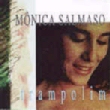|
|

Mônica Salmaso At a time when everyone is concerned about the proliferation of mass music in Brazil, Mônica Salmaso emerges as a powerful light. After having released her Afro-Sambas with Paulo Bellinati in 1995, Salmaso now comes forward with her first solo CD, Trampolim. She is becoming a household name, especially after being selected as Best Singer in the 2nd Visa/MasterCard/El Dorado Prize last May. Competing with over 1,200 vocalists from all over Brazil, in a process that took six months, Salmaso conquered both audiences and critics. Edu Lobo, famous Brazilian singer and songwriter, stated that Salmaso's voice is "the most beautiful voice" he's ever heard in recent times. São Paulo music critic Mauro Dias added that Salmaso "is one of the outstanding vocalists of the nineties." Previous to this solo release, you might have already heard Salmaso in other recordings. She was featured in Eduardo Gudin and Notícias Dum Brasil 1995 release as well as in Lumiar's Tom Jobim Songbook. In 1997 she was nominated for the Prêmio Sharp as Best New Artist. In a well prepared release by Blue Jackel, listeners can now experience the magic of Salmaso's voice and her captivating music performances. Backed by Rodolfo Stroeter (bass and music direction), Naná Vasconcelos (percussion and vocals), Toninho Ferragutti (accordion), Paulo Bellinati (guitar), Lelo Nazário (keyboards), and other superb musicians, and with the music of Lenine, José Miguel Wisnik, Guinga, Edu Lobo, Chico Buarque, and Dorival Caymmi, among others, Trampolim is simply mesmerizing from start to finish. To select a favorite track is an impossible task here. The moods in Trampolim encompass sublime and ethereal, country side and urban, religious and secular themes. Going deep into Brazilian roots, Salmaso opens with Canto dos Escravos (Song of the Slaves), a song that deals with the syncretism prevalent in Brazil. The song is a beautiful chant full of percussive sounds in the hands of talented Naná Vasconcelos. With A Permuta dos Santos (The Exchange of Saints), the religious theme is once again stressed with the procession of devotees walking from one church to the next as they pray to their saints. Toninho Ferragutti's accordion accompaniment and arrangement are magnificent. With Dorival Caymmi's O Bem do Mar (The Love in the Sea), Salmaso is joined by Paulo Bellinati's serene and extraordinary guitar work. The song is both peaceful and sad as it deals with the duality in a sailor's life, always torn between the love he left behind on land and his love for the sea. The same ocean theme is repeated in Lenda Praieira (Beach Legend). The tempo now is a little faster, but the serenity of these beach songs is not lost. In Lenine and Bráulio Tavares's Tuaregue e Nagô, Salmaso pays homage to the miscegenation of the races that comprise Brazil. Salmaso shines in every note. Lelo Nazário's piano and Teco Cardoso's soprano sax solos are out of this world. When Tuaregue e Nagô makes room for Dori Caymmi's music on Fernando Pessoas's poem Na Ribeira Deste Rio (On the Banks of this River), the listener is magically transported to a slowly moving river. And so, a new star is born, and her name is Mônica Salmaso. The multitude of senses and images conveyed by Salmaso's vocal mastery makes Trampolim a remarkable CD. It is paradise found. To sample some tracks and learn more about this release, you can visit Blue Jackel. Copyright © 1999 Egídio Leitão
|
| © 2011 Luna Kafé |